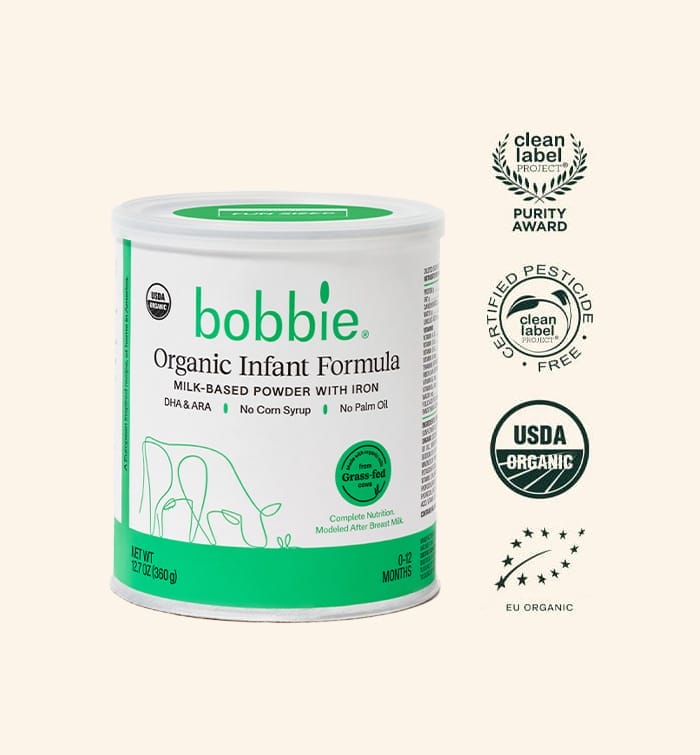We are proud to say that these posts are not sponsored. Our editorial team of Bobbie moms and writers personally select each featured product. If you buy something through our links, we may earn an affiliate commission, at no cost to you.
Deciding to exclusively formula feed is a big decision for many new parents. There are plenty of thoughts about the differences between formula fed and breast milk fed infants, like the age-old theory that formula-fed babies will sleep longer than breast milk-fed babies.
Let’s explore the differences between infant formula and breast milk, why a baby might wake up at night, and research surrounding whether formula-fed babies really do sleep longer. Dr Lauren Crosby, Board Certified Pediatrician and Bobbie Medical Advisor, helps clear up questions and gives her tips on helping your baby get better sleep.
Differences and similarities between breast milk and baby formula
By understanding the key differences and similarities between breast milk and baby formula, we can start to determine which factors affect your baby’s sleep habits— and your sleep habits as a parent!
- Differences and similarities between breast milk and baby formula
- Similarities between breast milk and formula
- Do formula fed babies sleep longer?
- Does a feeding right before bed or during the night help babies sleep longer?
- Should I wake my baby to eat?
- Differences between breast milk and formula
- Are there other reasons a baby may wake during the night?
- Dr Crosby’s tips to get baby to sleep longer
- Are there supplements to help babies sleep?
- Why do babies wake at night?
- So, do formula-fed infants really sleep longer?
Similarities between breast milk and formula
Formulas are designed to be as similar as possible to breast milk, so there are quite a few similarities between the two milk supply sources.1
Breast milk and formula are both nutritious
The purpose of both infant feeding methods is ultimately the same: a hungry baby needs to eat. Your baby needs nutrients and energy, and both infant formula and breast milk are wonderful options for infant nutrition.
Although the nutrients and elements of breast milk and formula are not 100% the same, formula is undoubtedly nutritious for growing babies.
Do formula fed babies sleep longer?
According to Dr Crosby, “Though the data has not been consistent regarding sleep and breastfeeding vs formula, there is some data that breastfed babies may sleep a little longer than formula-fed babies because of the maternal hormone melatonin that passes into breast milk. A mom’s natural melatonin levels go up during the night so that may help the breastfed baby sleep better at night.”
Your baby will always wake at night regardless of what they eat
Regardless of which feeding source you choose, newborn babies will wake up at night.2
It’s common for infants to wake every 2 to 3 hours for nighttime feeding, and neither formula feeding nor breastfeeding will guarantee that your baby sleeps through the night.
Does a feeding right before bed or during the night help babies sleep longer?
“Feeding an infant before bed is standard for babies,” says Dr Crosby. “That helps to ensure that they are gaining weight, growing well and are not waking up because of hunger.”
Should I wake my baby to eat?
Dr Crosby says this depends on the age of the baby. “If the baby is over 6 months old, then in general, a healthy, growing baby should not need to eat overnight.”
Differences between breast milk and formula
Formulas are made to be as close as possible to breastmilk. Still, as we mentioned above, formulas can’t be exactly the same as breast milk (yet!).
How breast milk and formula are made
As you know, breast milk is all-natural and produced by moms during and after pregnancy.
Formula that is sold in the US is regulated by the Food and Drug Administration (FDA). The FDA sets minimum requirements for the amount of certain nutrients in commercial infant formula.3
Thickness and consistency of breast milk and formula
Breast milk is generally thinner than formula. Breast milk can also be different colors, often depending on the types of food in a mom’s diet.4
Breast milk nutrients
Breast milk can provide certain substances that infant formula cannot, including antibodies, hormones, and white blood cells.5
Are there other reasons a baby may wake during the night?
Babies may wake for more reasons than just hunger, too.
Because it seems like all babies do is eat and sleep, many people think every time a baby cries or wakes it’s because they’re hungry—and that’s simply not true.
Hunger, sleep cycle transitions, teething, sleeping habits, and development all play a role in your child’s ability to sleep through the night.
Hungry babies
Of course, there are a lot of times where your baby may wake because they’re hungry. However, if your baby has had enough to eat during the day, it might be a sign that hunger is not the cause of their sleepless night. As babies start to get older, waking because they are hungry will become less common.6
Transition in baby’s sleep cycle
Like adults, babies may wake several times between sleep cycles throughout the night. This occurs when there is a shift from rapid eye movement (REM) sleep to other stages. It may be more difficult for babies to go back to sleep during these transitions, and some babies cry out because they’re frustrated or cranky.7
Baby teething
As your baby approaches the 6-month mark and starts eating solid foods, they will also begin teething. Teething can be uncomfortable and painful, and it often interrupts a baby’s sleep.
Sleeping habits for babies
No two babies are alike. Some babies are simply better sleepers than others. Thankfully, it is possible to sleep train for good sleeping habits and routines, even in young babies.7
Dr Crosby’s tips to get baby to sleep longer
- The baby’s overall intake of breast milk or formula should be adequate based on good weight gain and no medical problems that might interfere with sleep such as GERD or illnesses.
- Consistent bedtime routine
- Put the baby down on its back drowsy but awake.
- Try black out shades/curtains
Baby’s development
As your baby develops, you may notice that their sleep patterns change. Some babies wake at night simply because they want to explore or because their brains are actively developing new skills.7
Are there supplements to help babies sleep?
“There are no supplements recommended for infants specifically for sleep,” says Dr Crosby. “There are some infant probiotics with data demonstrating that specific ones reduce fussiness and crying time, which in turn may lead to baby sleeping better.”
Why do babies wake at night?
As much as we would like to have an answer to why babies wake at night (is it the breast milk? the formula?), no link has been found between one type of feeding and more or longer sleep at night.8,9
One study found that parents of exclusively breastfed infants up to 3 months of age slept an average of 40-45 minutes more than those who infants were given formula. The parents of formula-fed infants also reported more sleep disturbances than parents of breastfed infants.9
Another study that looked at 6-12 month old infants found no difference between night waking and night feeding for mothers who were breastfeeding compared to those who were formula feeding their infants. Interestingly, this study also found that infants who received more milk or solid foods during the day were less likely to eat at night, but not less likely to wake up at night.8
So, do formula-fed infants really sleep longer?
“This is a myth,” says Dr Crosby. “Multiple studies have looked into this and it has never consistently been demonstrated to be true.” She goes on to say that, “overall, this is all about the baby’s health and a consistent bedtime routine, not about breastfeeding vs formula.”
To summarize the truth about formula fed babies:
So, do formula-fed babies sleep longer? In the end, how long a baby sleeps is probably less related to what they eat and more related to lots of other factors. Each child is unique, and there’s no one-size-fits-all method to help your baby sleep through the night.
At the end of the day, all you can do is be patient. Your baby will eventually start sleeping through the night, regardless of breastfeeding or formula feeding. For now, do your best to manage the temporary exhaustion associated with the joys of having a newborn, and look forward to the day that your little one waits ’til sunrise to summon you for breakfast.
Verified by: Morgan Leafe, MD, MHA and Shira Page, RN, NP, CLC

Shop Bobbie Organic Infant Formula
Bobbie Organic Infant Formula is a USDA Organic, EU-style infant formula that meets all FDA requirements. It is a complete nutrition milk-based powder modeled after breast milk and is easy on tummies. It is non-GMO and doesn't have corn syrup, palm oil, or maltodextrin. Learn more about Bobbie.
Sources:
1- Infant formula | American Family Physician
2- Infant sleep | Stanford Children’s Hospital
3- Questions & answers for consumers concerning infant formula | Food and Drug Administration
4- Color of milk | La Leche League
5- Human milk composition: nutrients and bioactive factors | Pediatric Clinics of North America
6- How often and how much should your baby eat? | American Academy of Pediatrics
7- Why do babies wake up at night? | Seattle Children’s

